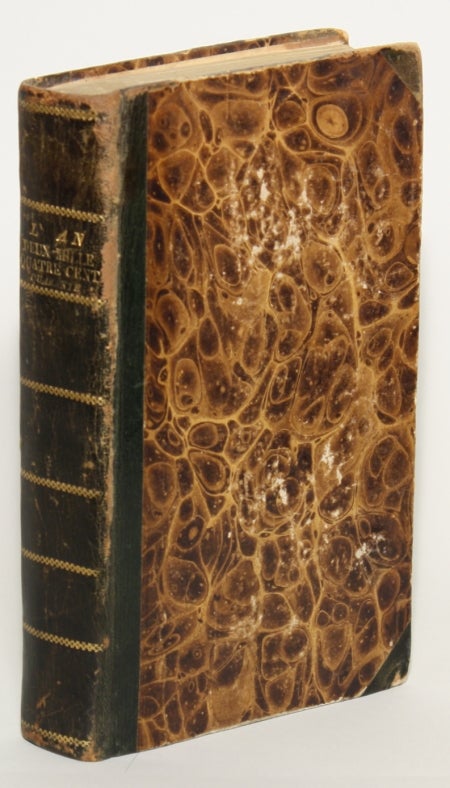L'AN DEUX MILLE QUATRE CENT QUARANTE. RÊVE S'IL FÛT JAMAIS. Nouvelle Edition, Revue & Corrigée par l'Auteur, qui a Jugé à Propos de Refondre le Chapitre de la Bibliothèque du Roi. A Londres [i.e. Paris], 1774. Octavo, pp. [iii-iv] v-xii 1-410, early three-quarter black leather and marbled boards, all edges stained yellow. First printing of the second edition, revised and corrected. "This first utopia set in future time was one of the eighteenth century's most successful books. It was immediately banned in France, put on the Inquisition's list of forbidden books in 1773, and condemned in Madrid in 1778 as a blasphemous work whose distributors, if discovered, would be fined five hundred ducats and sentenced to six years in prison. THE YEAR 2440 had eleven editions in French between 1771 and 1799, as well as two English translations and translations into Dutch, Italian, and German. Investigation of its printing history leads Everett Wilkie to conclude that 'there were 18,000 copies in print in three languages by the end of 1772 and 30,000 copies by the end of 1782, at which point it had spread thoroughly over Europe... 63,000 copies had been printed by Mercier's death' in 1814. The book was less successful across the Atlantic, but a 1795 Philadelphia edition was 'nevertheless, the first utopian novel published in North America.' George Washington and Thomas Jefferson owned copies of THE YEAR 2440." - Alkon, Origins of Futuristic Fiction, p. 117. "The theories of progress that pervaded European thought in the eighteenth century were born in France, a politically unsubmissive country which was preparing its revolution ... Inspired by the feeling of trust that characterized the Enlightenment, in 1771 the French writer Louis-Sébastien Mercier published the first uchronia, L'AN 2440 ... By favoring the notion of time and offering a vision of a future of happiness, uchronia acquired a historical dimension. History was now envisaged as a process of infinite improvement, and utopia, in the spirit of uchronia, was presented as a synchronic representation of one of the rings in the chain of progress ... In this way, utopias became dynamic, and promoted the idea that man had a role to fulfill." - Fátima Vieira, Clays, ed., Utopian Literature, p. 10. Mercier proposed a break with the past to create a better future. His "utopia provided a detailed and harsh critique of the ancien régime. Consequently, it was immediately banned upon its initial publication but went on to become a bestseller. It follows the classical utopian paradigm in proposing order based on reason, moderation and work. For Mercier, the path towards a better society lay in the triumph of reason over passion and the sacrifice of individual desires for the common good." - Nicole Pohl, Clays, ed., Utopian Literature, p. 74. "... although the earliest specimens of futuristic fiction were in English, the glory of discovering the true potentialities of the genre belongs to the French -- to Mercier who established the first satisfactory model of the new fiction ... The utopian prophecy of L'AN 2440, the first influential story of the future in world literature, became one of the most widely read books in the last quarter of the eighteenth century. The translations into Dutch and German, the English and American editions, and the many imitations show how Mercier beguiled his readers in two continents with the vision of a dream come true." - Clarke, The Pattern of Expectation 1644-2001, p. 23. Mercier's bibliographer, Everett C. Wilkie, Jr., states that only a few editions of this work are of textual importance: the first edition of 1771, this edition of 1774, the 1786 edition in 3 volumes, and the one of An VII (1798). This 1774 text has not been translated into English. See Alkon, Origins of Futuristic Fiction, esp. pp. 117-29. Anatomy of Wonder (1976) 1-29; (1981) 1-123; (1987) 1-63; (1995) 1-63; and (2004) II-757. Bleiler, Science-Fiction: The Early Years 1476. Claeys (ed), Utopian Literature, pp. 10; 74; 138, Clarke, Tale of the Future (1978), p. 2. Fortunati and Trousson (eds), Dictionary of Literary Utopias, pp. 43-5. Howgego, Encyclopedia of Exploration: Invented and Apocryphal Narratives of Travel M35. Lewis, Utopian Literature, pp. 120-22. Negley, Utopian Literature: A Bibliography 772 (not recording this edition). Versins, Encyclopédie de l'Utopie, des Voyages Extraordinaires et de la Science Fiction, p. 582. Bleiler (1978), p. 138. Reginald 10017. Binding rubbed at edges, corner tips a bit worn, old repair to upper right corner of title leaf, some damp staining to the text block, mostly to upper margins of several signatures, most noticeably signatures C and Y, a very good copy with a fairly clean interior. A scarce edition of this seminal book. (#90772).
Price: $850.00
"Nouvelle Edition" on title page.


